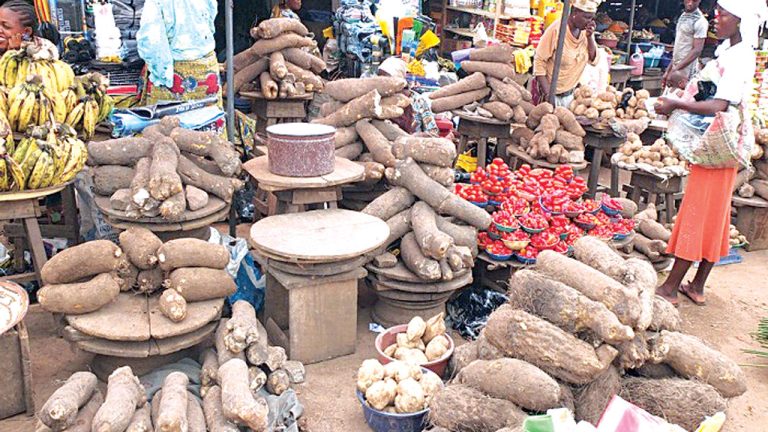It is about a few days before Christmas, and options and hopes that this yultide will be celebrated in its grandeur are very myopic .Feeding is part of the core that sustains our existence. It experienced about 32.84 per cent in November.
Nigeria’s inflation has reached an 18-year high, as reported by the National Bureau of Statistics (NBS) in its ‘Consumer Price Index: November 2023’ released on Friday. Headline inflation soared to 28.20%, up from 27.33% in October, marking a significant increase.
The cost of food, a major contributor to rising inflation, experienced the highest surge in Kogi, Kwara, and Rivers states, reaching 41.29%, 40.72%, and 40.22%, respectively. This surge reflects an 8.72 percentage point increase from November 2022 when food inflation stood at 24.13%.
The NBS report identified several factors contributing to the rise in food prices, including increases in the prices of bread and cereals, oil and fat, potatoes, yam and other tubers, fish, fruit, meat, vegetables, and coffee, tea, and cocoa.
On a month-on-month basis, the food inflation rate for November 2023 was 2.42%, marking a 0.51% increase compared to October 2023 (1.91%). The average annual rate of food inflation for the twelve months ending November 2023 was 27.09%, showing a 6.68 percentage points increase from the previous twelve-month average recorded in November 2022 (20.41%).
Bauchi (26.14%), Borno (27.34%), and Jigawa (27.63%) were identified as states where food was relatively cheaper in November.
The broader inflation picture for November revealed a surge in the headline inflation rate to 28.20%, a 0.87 percentage point increase from October’s 27.33%. On a year-on-year basis, this rate was 6.73 percentage points higher than November 2022, which recorded a rate of 21.47%.
The report contradicted recent claims by the Central Bank of Nigeria, asserting that month-on-month headline inflation in November was 2.09%, surpassing October’s 1.73%. The spike in inflation is largely attributed to the escalating prices of food items, signaling continued economic challenges for the country.
Inflation was worse in Kogi (33.28 per cent), Lagos (32.30 per cent), Rivers (32.25 per cent), which had higher rates than the national average and lowest in Borno (22.47 per cent), Katsina (24.91 per cent), and Plateau (25.53 per cent)
The World Bank, in its December update of the Nigeria Development Update report, has identified the removal of the fuel subsidy and the foreign exchange rate unification policy as key factors contributing to the recent surge in inflation in the country.
According to the report, petrol prices have witnessed an average increase of 163% since May, while the naira has depreciated by 41% against the US dollar in the official market and by 30% in the parallel market. This combination has significantly contributed to pushing inflation upwards, particularly affecting the prices of gasoline and other imported goods.
Highlighting the impact on the vulnerable population, the World Bank noted that the inflation surge has hit the poor and vulnerable the hardest. In response, the government has initiated targeted cash transfers to mitigate the impact on the most vulnerable households.
The report suggests a holistic approach to reducing inflation, emphasising the need for tighter fiscal and monetary policies.
The World Bank underscored the consequences of sluggish growth and rising inflation, pointing out that poverty in the country has increased from 40% in 2018 to 46% in 2023.
This has led to an additional 24 million people falling below the national poverty line, with the total number of poor individuals rising from 79 million in 2018 to 104 million in 2023.
While acknowledging that the reforms, particularly the removal of fuel subsidies and exchange rate unification, are expected to have positive impacts in the medium term through higher growth and lower inflation, the World Bank noted that the effects would be limited. The institution projected a decrease in poverty rates from 46% in 2024 to 44% in 2026.
Looking ahead, the World Bank suggested that inflation could decline in 2024 and beyond if there is an acceleration of monetary policy tightening.
Recently, the Governor of the Central Bank of Nigeria, Olayemi Cardoso, expressed the bank’s intention to focus on inflation and stabilise prices.



